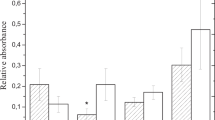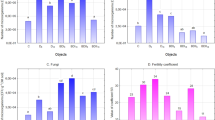Abstract
Diesel oil is a complex mixture of hydrocarbons with an average carbon number of C8–C26. The majority of components consist of alkanes, both straight chained and branched and aromatic compounds including mono-, di- and polyaromatic hydrocarbons. Regardless of this complexity, diesel oil can be readily degraded by a number of soil microorganisms making it a likely candidate for bioremediation. The concept of using plants to enhance bioremediation, termed phytoremediation, is a relatively new area of scientific interest. It is particularly applicable to diesel oil contamination as diesel oil generally contaminates the top few metres of soil (surface soil) and contamination is not uniform throughout the site. By encouraging plants to grow on diesel oil contaminated soil, conditions are improved for the microbial degradation of the contaminant. During this study, establishing plants on diesel oil contaminated soil proved difficult. Diesel oil is phytotoxic to plants at relatively low concentrations. At concentrations below this phytotoxic level, the development of plants grown in diesel oil contaminated soil differs greatly from plants grown in uncontaminated soil. Tolerance of plants to diesel oil and ability to germinate in diesel oil contaminated soil varied greatly between plant species as well as within plant species. The broadest differences in germination were seen within the grasses with certain species thriving in low levels of contamination (e.g. Creeping bent) while others were intolerant of diesel oil contamination (e.g. Rough meadow grass). The herbs, legumes and commercial crops screened appeared to be largely unaffected by low levels of diesel oil contamination (25 g diesel kg−1). At the higher level of contamination (50 g diesel kg−1), half of the twenty two plants species screened failed to reach a germination rate equal to 50% of the control rate. Two species of grass failed to germinate at all at this contamination level. Plant species that successfully germinated and grew were studied further to determine the effect of diesel oil contamination on the later stages of plant development. This work investigates the effect of diesel oil on plant growth and development.
Similar content being viewed by others
References
Cunningham, S.D., Anderson, T.A., Schwab, A.P. and Hsu, F.C.: 1996, Phytoremediation of soils contaminated with organic pollutants, Advances in Agronomy 56, 55–113.
Kruger, E.L., Anderson, T.A. and Coats, J.R.: 1997, Phytoremediation of contaminated water and soil. In: E.L. Kruger, T.A. Anderson and J.R. Coats (eds), Phytoremediation of soil and water contaminants. ACS Symposium Series 664. American Chemical Society, Washington, DC, pp 2–17.
Walton, B.T., Guthrie, E.A. and Hoylman, A.M.: 1994, Toxicant degradation in the rhizosphere. In: T.A. Anderson and J.R. Coats (eds), Bioremediation through rhizosphere technology. ACS Symposium Series 563. American Chemical Society, Washington, DC, pp 11–26.
Wang, X., Yu, X. and Bartha, R.: 1990, Effect of bioremediation on PAH residues in soil, Environmental Science and Technology 24, 1086–1089.
Author information
Authors and Affiliations
Rights and permissions
About this article
Cite this article
Adam, G., Duncan, H. Effect of Diesel Fuel on Growth of Selected Plant Species. Environmental Geochemistry and Health 21, 353–357 (1999). https://doi.org/10.1023/A:1006744603461
Issue Date:
DOI: https://doi.org/10.1023/A:1006744603461




